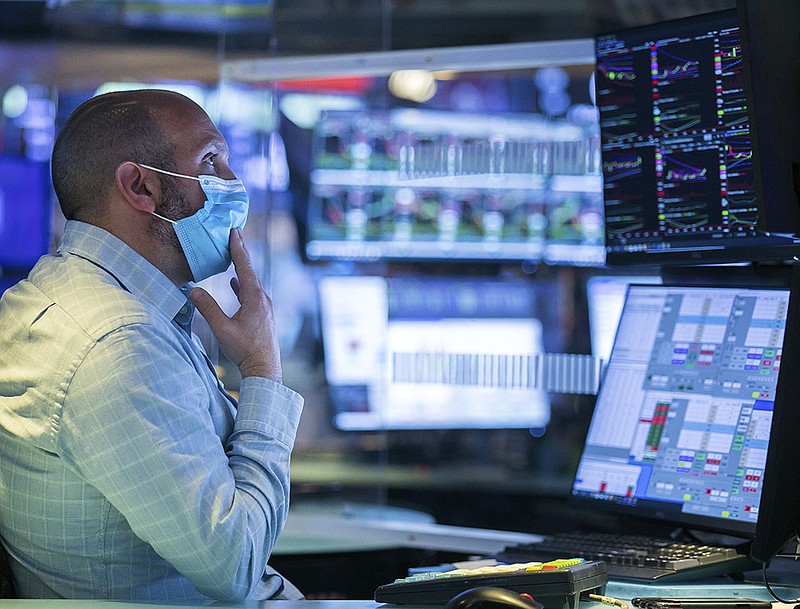Wall Street closed out another punishing week Friday with the S&P 500 posting its first back-to-back monthly loss since the pandemic first gripped the economy in March.
The S&P 500 dropped 1.2% and ended the week with a 5.6% loss, its worst in seven months. Sharp drops in big technology stocks drove much of the selling, reflecting worries that expectations had built too high for some of the market's biggest stars, including Apple and Amazon. Investors have bid up shares in those and other technology companies this year, anticipating they would deliver strong profits, but their latest results and uncertain outlooks left traders wanting.
The S&P 500 lost 40.15 points to 3,269.96. It ended October with a 2.8% loss. The Dow Jones Industrial Average fell 157.51 points, or 0.6%, to 26,501.60. Earlier, it had been being down 515 points.
The decline Friday leaves the S&P 500 with a gain of 1.2% for the year. As recently as Oct. 12, the index was up more than 9% for the year.
[CORONAVIRUS: Click here for our complete coverage » arkansasonline.com/coronavirus]
The Nasdaq composite gave up 274 points, or 2.45%, to 10,911.59. The tech-heavy index is within 0.6% of a "correction," Wall Street-speak for a decline of 10% or more from an all-time high.
Wall Street was already wracked by fears about the potential economic damage from surging coronavirus counts around the world, Washington's inability to provide more support for the economy and uncertainty surrounding the presidential election. President Donald Trump often cites the stock market as a barometer of his administration's performance on the economy.
The election adds to the uncertainty. For months Republicans have insisted on a smaller aid package, and the two parties have remained deadlocked. House Democrats passed a $2.2 trillion version earlier this month, over GOP opposition. Investors will have to game-out how various outcomes might further delay or fast-track an eventual stimulus or alter its size.
"If we see a blue wave, this could certainly alter the path of negotiations given the leverage Democrats will have going into 2021 and the increased prospects for a robust stimulus plan during Biden's first 100 days as president," said Nicole Tanenbaum, partner and chief investment strategist at Chequers Financial Management. Conversely, she said, a GOP-controlled Senate could be less willing to negotiate with a Democratic president, ultimately leading to a smaller spending bill.
[Video not showing up above? Click here to watch » https://www.youtube.com/watch?v=ucb8aaiM0T8]
Much of the market's focus Friday was on Apple, Amazon, Facebook and Google's parent company. They are four of the five biggest stocks in the S&P 500 by market value, which gives their movements outsize sway on the index, and they were principal forces behind Wall Street's huge rally since March.
All four reported profit for the summer that was even better than analysts were expecting, just like the other stock in the Big Five did earlier this week. But also like Microsoft, most nevertheless fell as investors found reasons for concern within their reports.
Apple dropped 5.6% after investors focused on weaker revenue than expected for its iPhones and sales in China. Amazon fell 5.4%, and Facebook lost 6.3%.
Twitter, another high-profile tech stock, slumped 21.1% for the largest loss by far among stocks in the S&P 500. It also reported better-than-expected earnings for the latest quarter. Investors focused instead on its growth in daily users, which fell short of analysts' expectations.
Google's parent company, Alphabet, was an outlier and rose 3.8% after reporting growth in digital ad spending.
A similar trend has been occurring across the market: Stocks are not getting the bounce they usually do after reporting results that beat analysts' expectations. And they've been giving investors plenty of opportunities to do so: With nearly three quarters of the S&P 500 by market value having reported, 84% of companies have beaten expectations, according to Credit Suisse.
Analysts say that's an indication that expectations may have been too high through the market's big rally and that investors' attention may simply be elsewhere given all the uncertainties sweeping the market.
Much of the market's focus has been on what's to come for the economy when coronavirus counts are rising at troubling rates across Europe and the United States.
Several European governments have already brought back restrictions on businesses to slow the spread of the virus. Even if the strictest lockdowns don't return in the United States, the worry is the pandemic's rising death toll will drive customers away from businesses by itself and undercut profits.
"Because of the spike in covid-19 overseas, with Germany and France in lockdown mode once again, the implication is that we could be heading into a double-dip recession in Europe, and that would have negative future implications for our economic growth." Stovall said.
Meanwhile, Washington has been unable to deliver more aid to the economy. That's despite investors and economists saying it's sorely needed after the expiration of supplemental benefits for laid-off workers and other stimulus approved by Congress earlier this year.
Trump "would actually like to see a big stimulus package -- however his incentive to pass fiscal stimulus goes away if he loses reelection," said Kristina Hooper, chief global market strategist at Invesco. "So I think chances are slim to none -- and slim may be leaving town right now."
Concern about the economic effect of any pandemic-related shutdown has been particularly evident in energy markets. West Texas Intermediate crude, the U.S. benchmark, fell 1% on Friday to close at $35.79, bringing its losses to 1% for the week.
In markets around the world on Friday, caution was still continuing to dominate. But the moves were not as violent as earlier in the week.
European markets ended mixed and Asian markets closed broadly lower.
Information for this article was contributed by Stan Choe, Alex Veiga and Joe McDonald of The Associated Press; by Matt Phillips and Eshe Nelson of The New York Times; and by Hamza Shaban of The Washington Post.
